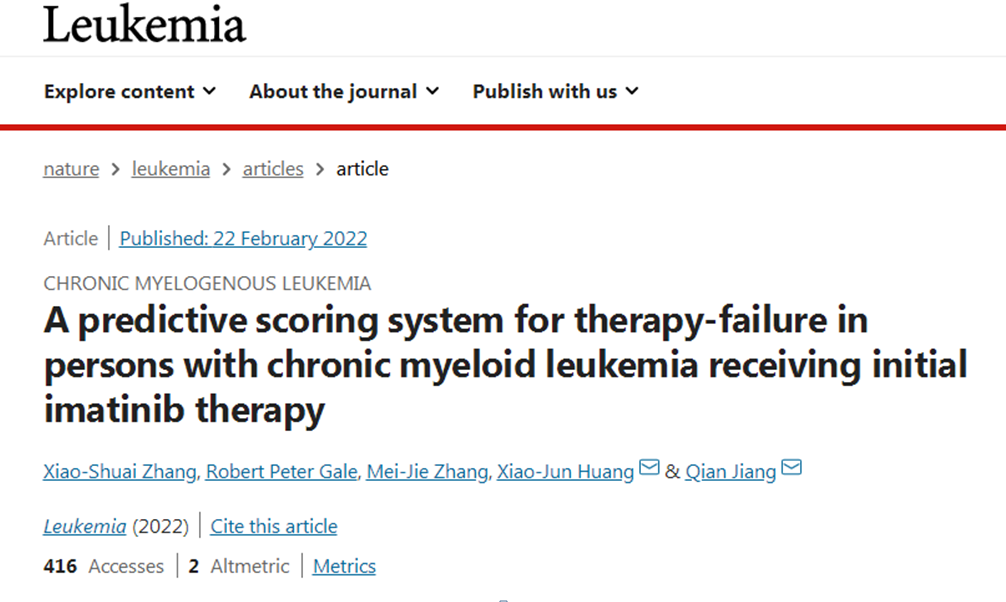Hematology | Research Team of Prof. Huang Xiaojun and Prof. Jiang Qian Establishes Predictive Scoring System for Therapy-failure of CML
2022-04-24
On February 22nd, 2022, the research team of Prof. Huang Xiaojun and Prof. Jiang Qian from the Department of Hematology at Peking University People’s Hospital and Peking University Institute of Hematology published a paper titled “A predictive scoring system for therapy-failure in persons with chronic myeloid leukemia receiving initial imatinib therapy” in Leukemia (IF:11.528), a leading international journal of hematology.

The advent of tyrosine kinase inhibitor (TKI) has significantly improved the survival outcome of patients with chronic myeloid leukemia (CML-CP). Several risk scoring systems, such as Sokal and ELTS, have been proposed to predict the outcome of overall survival. Today, thanks to TKI treatment, a vast majority of patients with CML are expected to live for a long period of time. In the context of long-term survival, treatment failure has become of great concern. The ability to accurately predict failure of imatinib therapy in someone with newly-diagnosed chronic phase CML would help physicians decide the best initial TKI-therapy.
To develop and validate a scoring system correlated with imatinib-therapy failure, the researchers interrogated data from 1,364 consecutive subjects with chronic-phase chronic myeloid leukemia (CML) receiving initial imatinib-therapy to identify co-variates predicting therapy failure. Subjects were randomly dividedtraining (n = 908) and validation datasets (n = 456). In the training dataset, WBC count ≥120 × 10E + 9/L, haemoglobin concentration <115 g/L, blood basophils ≥12% and European Treatment and Outcome Study for CML Long-Term Survival (ELTS) risk score were significantly-associated with failure-free survival (FFS). Each co-variate was assigned 1 point to develop the imatinib-therapy failure (IMTF) model except ELTS high-risk category which was assigned 2 points based on multi-variable regression coefficients. Area under receiver-operator characteristic curve values in the IMTF model for 1-, 3- and 5-year FFS were 0.79–0.84 in the training dataset and 0.78–0.85 in the validation dataset. Calibration plots showed high agreement between predicted and observed outcomes. Decision curve analyses indicated subjects benefited from clinical use of this model. Cumulative incidences of imatinib-therapy failure and probabilities of FFS among the 5 risk cohorts (very low-, low-, intermediate-, high- and very high-risk) using the IMTF model were significantly different (all p values < 0.001). The IMTF model also correlated with probabilities of progression-free survival and survival (all p values < 0.001). The research findings can be used by physicians to optimize TKI-therapy strategy at diagnosis in persons with chronic phase CML.
Zhang Xiaoshuai, a graduate student at Peking University People's Hospital, is the first author of this article. Prof. Jiang Qian and Prof. Huang Xiaojun are the co-corresponding authors. This work was supported by the National Natural Science Foundation of China and the National Institute of Health Research (NIHR) Biomedical Research Centre funding scheme.
Paper Link: https://www.nature.com/articles/s41375-022-01527-y

